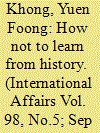|
|
|
Sort Order |
|
|
|
Items / Page
|
|
|
|
|
|
|
| Srl | Item |
| 1 |
ID:
120149


|
|
|
|
|
| Publication |
2013.
|
| Summary/Abstract |
This article employs the idea of the tributary system-most often associated with China's international relations from antiquity-to interpret how America relates to the rest of the world. I argue that the United States has instituted the most successful tributary system the world has ever seen. As the hub or epicenter of the most extensive network of formal and informal alliances ever built, the United States offers its allies and partners-or tributaries-military protection as well as economic access to its markets. In return for all its exertions, the tribute America seeks is straightforward: first, that it be recognized as the power or hegemon, and second, that others emulate its political forms and ideas. With both tributes in hand, the United States finds equanimity; it and the world are safe, at least from the United States' point of view.
|
|
|
|
|
|
|
|
|
|
|
|
|
|
|
|
| 2 |
ID:
061673


|
|
|
| 3 |
ID:
187654


|
|
|
|
|
| Summary/Abstract |
This article attempts to answer two questions. First, what are the relevant ‘how not tos’ when it comes to learning from history? I argue that from existing accounts of how policy-makers (mis)learn the lessons of history, we can derive four ‘how not tos’: 1) do not settle or fixate on the first, or most ‘available’ or ‘representative’ analogy; 2) do not dismiss differences between your favoured analogy and the case in question; 3) do not neglect alternative analogies; and 4) do not shirk from ‘testing’ the observable implications of your preferred analogy. Second, do policy-makers show awareness of these ‘how not tos’ as they use historical analogies? An examination of how they are using the Cold War analogy to interpret the nature and trajectory of contemporary US–China relations suggest that they seem to have avoided the worst pitfalls of analogical reasoning in foreign affairs. The most prominent users of these historical analogies show awareness of the first three of the above proscriptions; all, however, shy away from the fourth proscription—testing the prognostications of their favoured analogy. Although this is far from perfect, the signs point to the Cold War analogy being used in ways that avoid the general pattern of superficial and poor use documented in existing analyses of analogical reasoning in foreign affairs.
|
|
|
|
|
|
|
|
|
|
|
|
|
|
|
|
| 4 |
ID:
165034


|
|
|
|
|
| Summary/Abstract |
Power is shifting from the West to the East. Asia is experiencing the initial throes of this shift, where the key protagonists are the United States, the established power or hegemon, and China, the rising challenger and peer competitor. This article argues that the ongoing geopolitical competition between the United States and China is best viewed as a competition over the hierarchy of prestige, with China seeking to replace the US as the most prestigious state in the international system within the next thirty years. Although the competition is a global one, with China having made significant economic–political inroads into Africa, Latin America and even Europe, Asia is where China must establish its prestige or ‘reputation for power’ in the first instance. China seeks the top seat in the hierarchy of prestige, and the US will do everything in its power to maintain its pole position, because the state with the greatest reputation for power gets to govern the region: it will attract more followers, regional powers will defer to and accommodate it, and it will play a decisive role in shaping the rules and institutions of international relations. In a word, the state at the top of the prestige hierarchy gets to translate its power into the political outcomes it desires with minimal resistance and maximum flexibility.
|
|
|
|
|
|
|
|
|
|
|
|
|
|
|
|
| 5 |
ID:
127893


|
|
|
|
|
| Publication |
2013.
|
| Summary/Abstract |
How should the United States respond to China's rise? What are China's longterm strategic goals? What are the implications of U.S.-China strategic interactions for world order? Three recent works-Aaron Friedberg's A Contest for Supremacy, Hugh White's The China Choice, and Yan Xuetong's Ancient Chinese Political Thought, Modern Chinese Power-grapple with these questions in authoritative and revealing ways. This review essay examines the answers provided by these authors, with the aim of clarifying the different underlying assumptions that led them to their conclusions. Four themes are found to be especially pertinent. These are the assumptions the authors hold about the existing distribution of power, China's strategic objectives, the role of economic interdependence in Asia, and the relationship between democracy and political legitimacy. The way the authors parse these themes-which ones they bracket or admit into their analysis, and how they weigh and combine them-helps to reveal the underlying bases of their and, by implication, our policy preferences. The essay concludes by suggesting that contrary to the view of some, time has something to offer both sides. And if those opportunities are properly understood by the United States and China, the prospects for peaceful competition and coevolution improve.
|
|
|
|
|
|
|
|
|
|
|
|
|
|
|
|
|
|
|
|
|